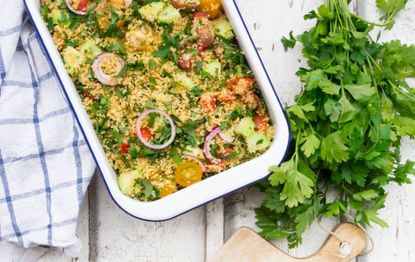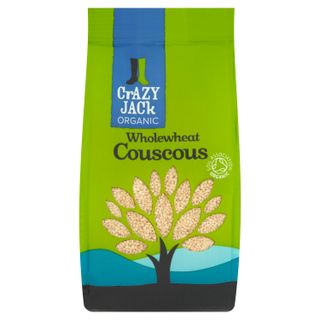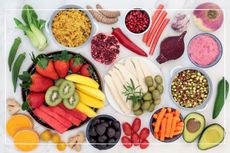Is couscous healthy? Couscous nutrition facts and benefits
We regard this versatile ingredient as a staple but is couscous good for you?


We regard this versatile ingredient as a staple but is couscous healthy?
Traditionally made by women who used the heel of their palms to roll a paste of ground wheat and water to create "grains", couscous derives from North Africa, where it's been eaten since at least the 13th century.
It's particularly prevalent in classic Moroccan dishes and is a brilliant addition to a salad (we love this easy couscous salad). Over time, it's become integrated into other cuisines and is especially popular in Africa, the Middle East, Italy, French and Spain – in part, because it's cheap, relatively nutritious, has a long shelf life and easily absorbs flavours in cooking.
There are different types of couscous, too. The most common is Moroccan couscous, which is made up of small grains. Then there's pearl couscous, which is made from larger spheres and is softer and chewier.
Is couscous healthy? Nutrition facts and benefits
'Couscous is a good source of carbohydrate, our main source of energy,' says dietician Karine Patel. 'And wholegrain couscous is a good source of fibre, which helps to reduce cholesterol, manage blood sugar levels, regulate stools and can reduce your risks of colon cancer,' says Karine.
'Couscous is also an excellent source of selenium. Selenium is a mineral with powerful antioxidant properties, which may help in reducing cancer risk and heart disease risk by reducing inflammation and build-up of plaque in your arteries. And it is also a good source of B vitamins, and contains some calcium, magnesium, iron and zinc and vitamin E,' adds Karine.
'Couscous contains about 112 calories in 100g of prepared [cooked] couscous,' says Karine. 'Therefore, the calorie content is similar to other grains like quinoa, but its calorie content is slightly lower than rice.'
GoodtoKnow Newsletter
Parenting advice, hot topics, best buys and family finance tips delivered straight to your inbox.
While this isn't particularly calorific, neither is couscous considered low calorie meals. This is because 'couscous is a staple food offering calories mostly in the form of carbohydrate,' says Rob.
Treat couscous as you would any other carb on your plate which, according to the NHS Eatwell Guide, should make up just over a third of the food we eat.
The nutritional breakdown of 50g couscous (125g cooked):
- 184 calories
- Low in fat: 1.1g
- Low in saturated fat: 0.2g
- A good source of protein: 6.6g
- A good source of B vitamins: B1 (13% RI); B3 (17% RI); folate (7% RI)
- A good source of magnesium (8% RI); iron (7% RI); zinc (9%RI); potassium (7% RI)
Is couscous gluten free?
'No, couscous is made from a type of flour called semolina, a flour derived from wheat, so it naturally contains gluten,' explains Karine.
'However, you can get gluten-free couscous made from corn,' says nutritionist Rob Hobson. If you're gluten intolerant, try Clearspring Organic Instant Gluten Free Couscous (£1.99 for 200g, Ocado).
Is couscous a carb or a grain?
It's both! 'Couscous is a processed grain derived from durum wheat semolina,' says Karine. 'And it consists mainly of carbohydrates – roughly 23g of carbohydrates per 100g of prepared couscous.'
But if couscous is processed does that mean it isn't good for us? 'The definition of processed – with respect to food – simply means a food has been altered in some way during its preparation so, yes, couscous is processed as the grain has been milled,' explains Rob. 'We have become so used to the narrative that all processed foods are bad for us and almost everyone associates the term with foods high in fat, salt and sugar. However, foods like couscous are healthy and a staple in the diet of many countries around the globe, especially North Africa.'
'You can get wholewheat couscous,' adds Rob (try Crazy Jack Organic Wholewheat Couscous, £1 for 250g, Sainsbury's). 'Although the term "wholewheat" may have you thinking it's not processed it is – the wholewheat durum wheat is still milled down to make couscous.'

Is couscous healthier than rice?
'If you compare white rice to couscous, then the calories are pretty much the same,' says Rob. 'However, couscous contains more protein and higher amounts of vitamins and minerals so you could say it was slightly healthier. If you compare brown rice to couscous, again it contains roughly the same number of calories but higher levels of nutrients such as B vitamins and magnesium. However, couscous still contains more protein than brown rice,' he explains.
'Couscous is a better source of fibre than white rice,' adds Karine. 'And wholewheat couscous is a better source of fibre than brown rice. But rice is a gluten-free grain; therefore, it's suitable for those with coeliac disease or with a gluten or wheat intolerance.'
'Both couscous and rice are healthy foods to include as part of a balanced diet,' says Rob. 'Interestingly, basmati rice scores lower on the glycaemic index than both couscous and brown rice, so if you’re trying to follow a lower GI diet then this may be the better choice of carbohydrates.'
We spoke to the following experts:

Rob Hobson is an award-winning registered nutritionist, with more than 15 years experience. Accredited by the AFN and SENR, he also has degrees in nutrition, public health nutrition and sports nutrition. Rob is a published author of three successful books, Unprocess Your Life, The Detox Kitchen Bible and The Art of Sleeping. He has acted as Head of Nutrition at Healthspan since 2013.

Karine Patel is the director of Dietitian Fit and a member of the Health & Care Professions Council (HCPC) and the British Dietetic Association (BDA). She holds a Bachelor of Science in Nutrition & Dietetics from McGill University in Montreal, Canada, and a Master of Science in Nutrition & Dietetics.

Debra Waters is an experienced online editor and parenting writer. She also has a strong background on health, wellbeing, beauty, and food. She currently writes for Goodto and Woman&Home, and print publications Woman, Woman’s Own, and Woman’s Weekly. Debra has written for What to Expect, Everyday Health, and Time Out. In addition, she has had articles published in The Telegraph and The Big Issue.
-
 Why do I crave sugar? Causes of sugar cravings and how to stop them
Why do I crave sugar? Causes of sugar cravings and how to stop themIf you're someone who suffers from sugar cravings you'll know how hard it is to give up the sweet stuff. But you're not alone.
By Debra Waters Published
-
 Low sodium diet: the benefits of reducing salt and what foods to eat
Low sodium diet: the benefits of reducing salt and what foods to eatBy Emily-Ann Elliott Published